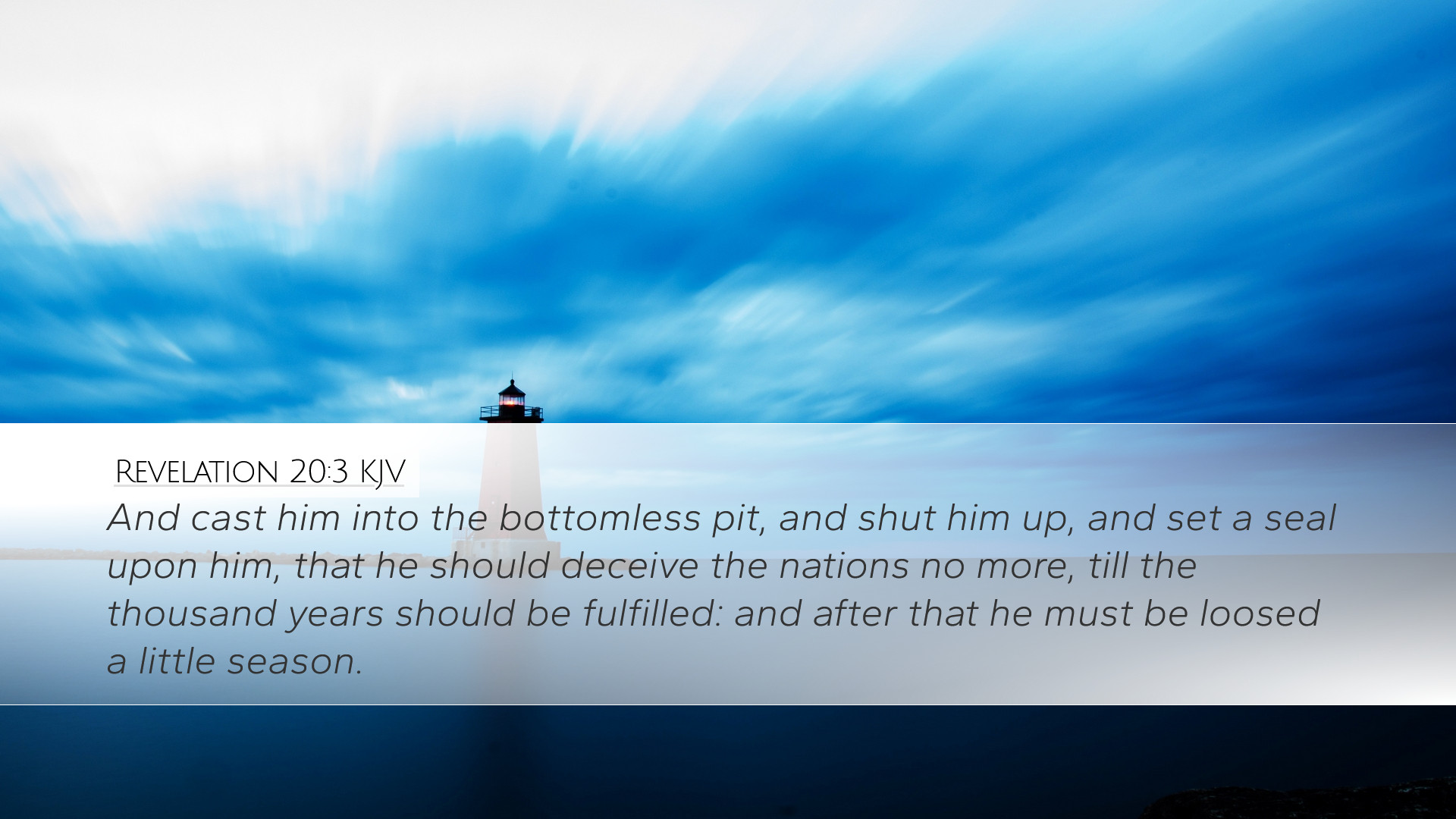Commentary on Revelation 20:3
Text: "And cast him into the bottomless pit, and shut him up, and set a seal upon him, that he should deceive the nations no more, till the thousand years should be fulfilled: and after that he must be loosed a little season."
Introduction
The verse Revelation 20:3 serves as a critical juncture in the holistic narrative of the Apocalypse, referring to the binding of Satan for a thousand years. Understanding this segment requires an exploration of various biblical themes, especially concerning eschatology, the nature of evil, and God’s overarching sovereignty throughout the ages.
Exegesis and Insights
This verse encompasses several vital theological tenets, elucidated beautifully by traditional commentators.
Binding of Satan
Matthew Henry’s Commentary: Henry interprets the binding of Satan as a divine and liberative act. The act of casting Satan into the "bottomless pit" symbolizes God's control over evil and His power to restrict its influence. Henry notes that the "bottomless pit" signifies a place of confinement rather than annihilation, suggesting that Satan is allowed no power during this period. The seal put upon him indicates a divine decree that limits his operations, augmenting the assurance of believers during the millennial reign.
Deception of the Nations
Albert Barnes’ Notes on the Bible: Barnes emphasizes that Satan's role as the deceiver is central to understanding human sinfulness. By being confined, the nations experience a respite from spiritual deception. Barnes draws attention to how the absence of Satan’s influence allows for the spread of truth and righteousness. He articulates that this period marks an era where the faithful witness of Christ can flourish unimpeded.
The Thousand Years and its Significance
Adam Clarke’s Commentary: Clarke delves into the symbolic meaning of the "thousand years," advocating that it should be interpreted either literally or figuratively, representative of a lengthy, unspecified period. Clarke posits that the mention of "years" serves as a reminder of God's appointed times, and aligns with the redemptive unfolding of history through Christ’s reign. This period offers a glimpse into the fullness of God’s plan, offering Christians hope of participation in Christ’s victory over evil.
Theological Implications
This verse carries profound theological implications particularly impacting the doctrines of election, sin, and the ultimate defeat of evil.
The Defeat of Evil
Henry further emphasizes God’s triumph over evil, reflecting on how this passage reassures believers that even though evil persists (as seen in the world today), God has already secured victory through Christ. The confinement of Satan symbolizes that ultimate evil’s power is curtailed, affirming that God not only allows evil for a time but holds the authority to ultimately prevail over it.
The Hope for Believers
Both Barnes and Clarke underline that the binding of Satan should encourage Christians by affirming that their participation in Christ's kingdom is assured and that they are not subject to the manipulations of evil. This binding reflects the reality of God’s providential care, offering hope that righteousness will reign, and believers are called to live in that confidence.
Contemporary Application
The truths illustrated in Revelation 20:3 extend beyond eschatological insights; they bear significant relevance to contemporary Christian living.
Living in Light of Victory
Clarke asserts that believers are to conduct themselves in light of the victory secured by Christ. As they await the final fulfillment of these prophecies, they should actively engage in spreading the truth of the Gospel, reflecting on the magnitude of Christ's authority over the forces of darkness.
Community and Unity in Christ
Barnes also emphasizes that the absence of deception should provoke Christians to foster unity among themselves. In a world still laden with confusion and chaos, believers are called to be beacons of truth, empowering one another through love and sound doctrine, propelled by the assurance that the evil one is restrained.
Conclusion
Summary: Revelation 20:3 is steeped in theological significance, encapsulating the grand narrative of God’s sovereignty in redemption. Commentators like Henry, Barnes, and Clarke highlight the gravity of Satan's binding, the ongoing reality of spiritual warfare, and the hope for believers as a consequence of Christ's triumph. As such, this verse encourages a robust engagement in faith, equipping believers to live with purpose and assurance in the light of God's ultimate plan.


